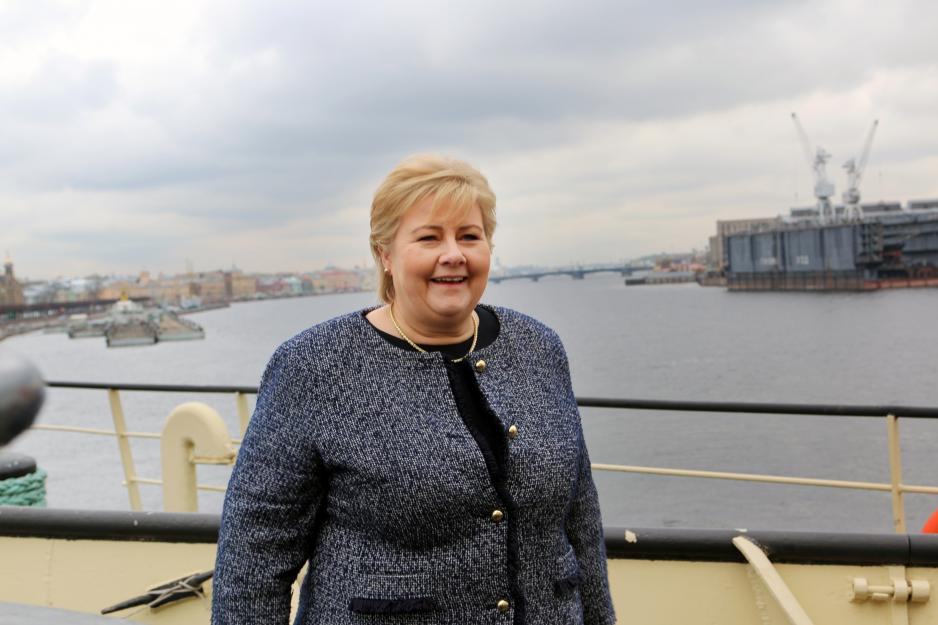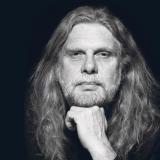Putin’s Arctic Dialogue: Meets Solberg On Stage

Norwegian Prime Minister Erna Solberg in St. Petersburg for the "Arctic: Territory of Dialogue” conference. (Photo: Amund Trellevik)
When Prime Minister Erna Solberg Tuesday enters the stage with Russian President Vladimir Putin, it is about far more than just the relationship between Norway and Russia. From a western perspective, it has as much to do with the relationship to China.
ST. PETERSBURG: Two hours later, Solberg and Putin meet for a bilateral Norwegian-Russian conversation, this time without an audience present. In order to understand the significance of that meeting, it is worth noting that we have to go back a decade, to 2009, to find an equivalent bilateral meeting.
Nordic summit
In between these two meetings, there is also the Russian annexation of the Crimea in 2014, and the subsequent and increasingly stronger western sanctions against Russia.
There has, nevertheless, not ben any lack of political contact between Norway and Russia following the Crimean crisis. I myself was present when former Foreign Minister Børge Brende met with his Russian counterpart Sergey Lavrov at a similar conference during the International Arctic Forum in Arkhangelsk in March 2017.
Their meeting did not bring much of a result, and Børge Brende also left his mark through leaving the meeting during the main part of the program; Vladimir Putin’s meeting with the Finnish and the Icelandic presidents on stage.
China entering the power struggle
This time, however, PM Erna Solberg enters the podium alongside with her Swedish, Finnish and Icelandic colleagues. The international attendance is thus significantly expanded. The change of scene is not just symbolic, it is also very genuine.
Two more years have passed since the annexation of the Crimea. Add to this the fact that China today plays a quite different part in international politics compared to what it did in 2017, and the significance of this meeting appears even more clear.
In 2017, Norway was struggling to get on speaking terms with the Chinese following Chinese boycott of Norway related to the awarding of the 2010 Nobel Peace Prize to Lui Xiaobo.
Norway recently resumed dialogue with China again, though the atmosphere has now changed once again.
Forced marriage
While the USA and the rest of the West behave with increasing skepticism towards Chinese technology and ideology, China and Russia have found each other in the shadow of the western sanctions against Russia.
Many characterize this as a forced marriage between a former superpower, Russia, and an international superpower, China. In the vacuum following the sanctions against Russia, China has entered Russian politics and economics as an investor and lender in a way that contributes to entrenching the divide between the East and the West. A Russia under Chinese influence is in many ways worse for the West than the conflict that rules the ground between Russia and the West.
When the Nordic political leaders have agreed to meet with Vladimir Putin in St. Petersburg, it has much to do with maintaining dialogue with Russia in order to not pressure her further into Chinese dominance.
Oceans and spies
This does, however, not mean that the formal reason for going to Russia - joint discussions about the ocean - is not genuine. Ocean management cooperation between Norway and Russia is extremely important, in particular to Norway. The fisheries management cooperation between the two countries has survived both the Cold War and the sanctions, and it is also within the context of ocean management cooperation that Norway and Russia will expand its cooperation in the future and, through that, the dialogue between the two countries. Erna Solberg will raise a series of ocean projects in her meeting with the Russian president.
Change of atmosphere
Many also expect Erna Solberg to raise the issue of the situation for Norwegian Frode Berg, who is imprisoned in Moscow on spy charges. If that were to happen, that would be because the “leg work” has been done beforehand. During the past few days, Norwegian intelligence services have dismissed their charges against the Russian man who was alleged of spying during a seminar in the Norwegian parliament last year. And just the other day we learned that a Norwegian prawn trawler was allowed to leave Murmansk following its having been arrested at the end of March.
Trying to interpret this into a larger context at this stage would only be speculations.
There is, however, no reason to speculate about whether Erna Solberg’s visit to Russia, a visit during which she is accompanied by Foreign Minister Ine Eriksen Søreide, goes to emphasise that a change of atmosphere is underway between Russia and the rest of Europe.

